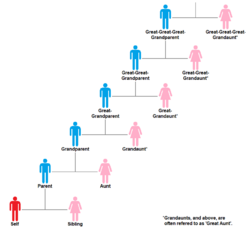Aunt
Topic: Social
 From HandWiki - Reading time: 6 min
From HandWiki - Reading time: 6 min
An aunt is a female individual who is a sibling of a parent or married to a sibling of a parent. Aunts who are related by birth are second-degree relatives. Alternate terms include auntie or aunty.
Aunt, auntie, and aunty also may be titles bestowed by parents and children to close friends of one or both parents who assume a sustained caring or nurturing role for the children.[1] Children in some cultures and families may refer to the cousins of their parents as aunt or uncle due to the age and generation gap. The word comes from Latin: amita via Old French ante and is a family relationship within an extended or immediate family.
The male counterpart of an aunt is an uncle, and the reciprocal relationship is that of a nephew or niece. The gender-neutral neologism pibling, a shortened form of parent's sibling, is used for both aunts and uncles.[2]

Types
- A half-aunt is a half-sister of a parent.
- A maternal aunt is the sister of one's mother.
- A paternal aunt is the sister of one's father.
- An aunt-in-law is the wife or female partner of one's uncle.[3]
- A parent's first cousin may be called a second aunt.
- A great-aunt[4][5] or grandaunt[6] (sometimes written grand-aunt[7]) is the sister of one's grandparent.
Genetics and consanguinity
Aunts by birth (sister of a parent) are related to their nieces and nephews by 25%. As half-aunts are related through half-sisters, they are related by 12.5% to their nieces and nephews. Non-consanguineous aunts (female spouse of a relative) are not genetically related to their nieces and nephews.
Cultural variations
In some cultures, such as Aboriginal and Torres Strait Islander peoples of Australia, respected senior members of the community, often also referred to as Elders, are addressed as "uncle" (for men) and "aunt" for women, as a mark of seniority and respect, whether related or not,[8][9] such as Aunty Kathy Mills.[10]
In several cultures, no single inclusive term describing both a person's kinship to their parental female sibling or parental female in-law exists. Instead, there are specific terms describing a person's kinship to their mother's female sibling, and a person's kinship to their father's female sibling, per the following table:[citation needed]
| Language | Mother's sister | Father's sister |
|---|---|---|
| Albanian | teze | hallë |
| Kurdish | Xaltîk (IPA: xɑːltiːk) | Metik (IPA: mɛtɪk) |
| Arabic | خالة (khālah) | عمّة (ʿammah) |
| Assamese | Mahi | Pehi |
| Bengali | খালা (khala) | ফুফু (phuphu) |
| Finnish | Täti | Täti |
| Hindi | Mausi | Bua |
| Korean | 이모 (Imo) | 고모 (Gomo) |
| Marathi | Mavashi | Aatya |
| Persian | (خاله)khaleh | (عمّه)ammeh |
| Polish | ciotka (diminutive: ciocia) | stryjna (diminutive: stryjenka) |
| Swedish | moster | faster |
| Turkish | teyze | hala |
| Ukrainian | вуйна / vujna | стрийна / stryjna |
In popular culture
Aunts in popular culture have not always been portrayed as positive roles. Childless aunts are often subjected to othering in popular culture and presented as exotic or as having a second-best role, with motherhood preferred.[11]
Aunt Flo is a popular euphemism referring to the menstrual cycle.
An agony aunt is a colloquial term for a female advice columnist.
Fictional aunts include:
- Aunt Agatha and Aunt Dahlia, both aunts to Bertie Wooster in the Jeeves stories of P. G. Wodehouse: Aunt Agatha is haughty and fearsome, while Aunt Dahlia is more genial.
- May Parker, the aunt of Spider-Man.
- Eunice, the abusive aunt of Joker.
- Auntie Mame, title character in the novel and film.
- Petunia Dursley, the aunt of the protagonist of Harry Potter by J. K. Rowling.
- Vivian Banks, the aunt of the main character in The Fresh Prince of Bel-Air.
- Aunt Sally, a character in the Worzel Gummidge books and TV series.
- Auntie Em, the aunt of Dorothy Gale in the Oz books and film.
- Aunt Spiker and Aunt Sponge, the villainous aunts of James Trotter in James and the Giant Peach.
- Diane, the tomboyish aunt of Daniel in Chicago Party Aunt.
- Karasu and Washi, the twin aunts of Kubo from Kubo And The 2 Strings.
See also
- All pages with titles beginning with Aunt – includes many articles with titles "Aunt [name]."
- Auntie (disambiguation) (also includes "Aunty")
References
- ↑ Bashir, Imani (2019). "When an auntie is not actually a relative". https://www.washingtonpost.com/lifestyle/2019/02/04/when-an-auntie-is-not-actually-relative/.
- ↑ Straussman, Min (2021). "Piblings & Niblings: Do You Know These Words For Aunts, Uncles, Nieces, & Nephews?". https://www.dictionary.com/e/aunt-uncle-niece-nephew-words/.
- ↑ "Aunt-in-law, N." Oxford English Dictionary, Oxford UP, December 2024, https://doi.org/10.1093/OED/1008652953
- ↑ "Definition of great-aunt in English by Oxford Dictionaries". https://en.oxforddictionaries.com/definition/great-aunt.
- ↑ "Google Ngram Viewer of relative versions of name". https://books.google.com/ngrams/graph?content=%5Bgreat+-+aunt%5D%2Cgreat+aunt%2C%5Bgrand+-+aunt%5D%2Cgrandaunt%2Cgreataunt%2Cgrand+aunt&case_insensitive=on&year_start=1800&year_end=2008&corpus=15&smoothing=10&share=&direct_url=t4%3B%2C%5Bgreat%20-%20aunt%5D%3B%2Cc0%3B%2Cs0%3B%3Bgreat%20-%20aunt%3B%2Cc0%3B%3BGreat%20-%20Aunt%3B%2Cc0%3B%3BGreat%20-%20aunt%3B%2Cc0%3B.t4%3B%2Cgreat%20aunt%3B%2Cc0%3B%2Cs0%3B%3Bgreat%20aunt%3B%2Cc0%3B%3BGreat%20Aunt%3B%2Cc0%3B%3Bgreat%20Aunt%3B%2Cc0%3B%3BGreat%20aunt%3B%2Cc0%3B.t4%3B%2C%5Bgrand%20-%20aunt%5D%3B%2Cc0%3B%2Cs0%3B%3Bgrand%20-%20aunt%3B%2Cc0%3B%3BGrand%20-%20aunt%3B%2Cc0%3B%3BGrand%20-%20Aunt%3B%2Cc0%3B.t4%3B%2Cgrandaunt%3B%2Cc0%3B%2Cs0%3B%3Bgrandaunt%3B%2Cc0%3B%3BGrandaunt%3B%2Cc0%3B.t4%3B%2Cgreataunt%3B%2Cc0%3B%2Cs0%3B%3Bgreataunt%3B%2Cc0%3B%3BGreataunt%3B%2Cc0%3B%3BGreatAunt%3B%2Cc0%3B.t4%3B%2Cgrand%20aunt%3B%2Cc0%3B%2Cs0%3B%3Bgrand%20aunt%3B%2Cc0%3B%3BGrand%20Aunt%3B%2Cc0%3B%3Bgrand%20Aunt%3B%2Cc0.
- ↑ "Grandaunt definition and meaning | Collins English Dictionary". https://www.collinsdictionary.com/dictionary/english/grandaunt.
- ↑ "Definition of grand-aunt in English by Oxford Dictionaries". https://en.oxforddictionaries.com/definition/grand-aunt.
- ↑ "Communicating with Aboriginal and Torres Strait Islander Audiences". 23 February 2016. https://www.pmc.gov.au/resource-centre/indigenous-affairs/communicating-aboriginal-and-torres-strait-islander-audiences.
- ↑ Browning, Daniel (14 September 2022). "'I called him Uncle': Remembering iconic theatre great Uncle Jack Charles". Australian Broadcasting Corporation. https://www.abc.net.au/news/2022-09-14/uncle-jack-charles-aboriginal-artist-indigenous-elder-leader/101437098.
- ↑ Mills, Aunty Kathy. "You belong to my heart" (in en). https://www.spunstories.net/kathy-mills.
- ↑ Jones, Anna. "'Aunt with no kids': The women redefining family roles" (in en). https://www.bbc.com/worklife/article/20211208-aunt-with-no-kids-the-women-redefining-family-roles.
External links
 |
 KSF
KSF